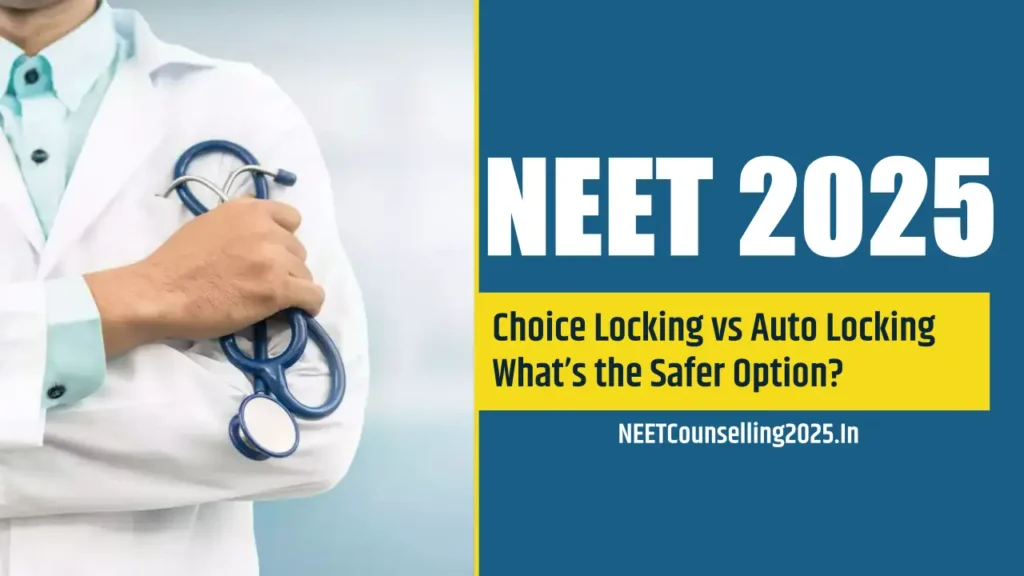The choice-locking phase of NEET counselling may seem like just another click—but this is the biggest click that will determine your fate of admission into a medical college.

In the rounds of All India Quota (AIQ) run by the MCC, you must finalize the list of preferences that you have spent a lot of time deliberating by technically “locking” your choices in a timely manner before the deadline. However, what happens if you forgot? Thankfully, if you miss your own manual deadline, the system will auto lock your last saved choices.

While auto locking your choices may seem reassuring, relying solely on the auto locking process can be a gamble.
On the other side, manually locking your choices gives you total control, reconfirmation, and documentation, meaning you get to review and confirm that everything is right just before you submit. Both manual locking and auto locking finalize the choice-filling stage, but manual locking compared to auto locking provides more certainty, control, and relaxation.
Table of Contents
- 1 What Is Choice Locking and How Does It Work?
- 2 What Is Auto Locking? How Does the System Handle It?
- 3 Comparison: Manual vs Auto Locking
- 4 Frequently Asked Questions
- 4.1 Q. What is the difference between choice locking and auto locking?
- 4.2 Q. Which is safer manual choice locking or auto locking?
- 4.3 Q. Can I change my choices after they are auto locked?
- 4.4 Q. What happens if I forget to lock my choices manually?
- 4.5 Q. Do I get a confirmation slip after auto locking?
- 4.6 Q. Can auto locking affect my seat allotment chances?
- 4.7 Q. Should I rely on auto locking if I am busy or facing emergencies?
- 4.8 Q. How can I confirm that my choices have been locked successfully?
What Is Choice Locking and How Does It Work?
Choice locking is the final stage in NEET counselling process meaning candidates confirm the sequence of colleges and courses rank choice filling. Once chose you lock them, they are confirmed – you can’t change or re-arrange after that. This is so that candidates confirmed nearest list can be used by the counselling authority like MCC for All India Quota or state counselling boards whilst processing seat allotments.
How It Work:
Step 1: Choice Filling – You log in to the counselling portal and can reorder as many colleges and respective courses you like in a prioritised sequence.
Step 2: Review – During the time-frame given to review your preferences, you will be able to add, delete or completely rearrange the preference ranking.
Step 3: Locking – Once you have finalised your selection (and all changes), you can “Lock Choices”. The next screen will ask you for confirmation before submitting. Once you submit the lock register, you can not make anymore edits to your choice register.
Step 4: Print Copy or Save – A confirmation page (known as a choice-locking slip) evidencing your finalised choice record will be produced. You should save and print this page for future reference.
Important Point: If you have not manually locked choices prior to ending the deadline, the last saved preferences will be locked automatically (known as auto locking). This means if the last saved preference was intentionally or mistakenly save that became the preferences that will locked.
What Is Auto Locking? How Does the System Handle It?
When a candidate does not lock their choices before the deadline for choice locking, auto locking is the process where the system will automatically freeze the candidate’s last saved choices. This is to protect the candidate from being omitted from the seat allotment because he/she forgot to lock his/her choices.
How does the system treat auto locking?
Time-Based: When the counselling portal closes for choice locking, the system will automatically lock the last saved version of the candidate’s choices.
No Option for Validation: Unlike choice locking, the system does not allow the candidate to review or confirm his/her list before it locks.
Finality: When auto locking occurs the same rules apply as with choice locking—there is no opportunity to edit or reorder his/her preferences.
Print Slips: In most counselling portals (like MCC), an auto locked choice list is usually downloadable. However, since the candidate did not lock the choices manually, chances of seeing discrepancies are limited.
Important: Auto locking was intended as a back-up feature, but simply being a back-up feature adds risk. If the preferences of the candidate were incomplete, incorrectly ordered, or did not save properly, the system will accept the preferences and treat them as final.
Comparison: Manual vs Auto Locking
When it comes to finalizing your NEET counselling choices, understanding the difference between manual (choice) locking and auto locking is crucial. Both methods serve the same purpose to finalize your preferences but they differ in control, certainty, and risk.
| Feature | Manual (Choice) Locking | Auto Locking |
|---|---|---|
| Control | You have full control to review, rearrange, and finalize your list before submission. | The system locks whatever was last saved, even if the order is incorrect or incomplete. |
| Confirmation | You receive a confirmation slip immediately after locking; you can download and print it. | Some portals generate an auto-lock slip, but you may not notice mistakes until after the deadline. |
| Flexibility | You can make last-minute edits until you click “Lock Choices.” | No changes are possible once the deadline passes; system locks automatically. |
| Peace of Mind | High you know exactly what was submitted and have proof of submission. | Lower relying on auto locking may cause anxiety about whether the saved choices are accurate. |
| Risk of Errors | Low if you review properly; errors are usually caught before locking. | Higher if last saved choices were incomplete, misordered, or not updated, they become final. |
| Ideal For | Students who can be present during the deadline and want full control. | Students who may be unavailable or face unforeseen emergencies, but it should only be a fallback option. |
Frequently Asked Questions
Q. What is the difference between choice locking and auto locking?
A. Choice locking is when you manually confirm and freeze your preference list before the counselling deadline. Auto locking occurs when the system automatically locks your last saved choices if you forget to lock manually.
Q. Which is safer manual choice locking or auto locking?
A. When it comes to locking in choices, manual choice locking is safer than auto locking because it offers full control, confirmation and documentation. Auto locking is a secondary option and should not be relied on as the primary method of locking.
Q. Can I change my choices after they are auto locked?
A. Once the system auto locks your choices, they are locked and done for good (same for manually locked choices).
Q. What happens if I forget to lock my choices manually?
A. If you forget, the counselling system automatically locks your last saved preferences at the deadline. However, any errors or incomplete entries in the saved list become final.
Q. Do I get a confirmation slip after auto locking?
A. Most counselling portals provide a slip even for auto-locked choices, but it may be harder to verify or notice mistakes compared to manual locking.
Q. Can auto locking affect my seat allotment chances?
A. If your last saved choices are incomplete or in the wrong order when you auto lock, it will freeze them as they are, and it may affect the seat you get.
Q. Should I rely on auto locking if I am busy or facing emergencies?
A. Auto locking is an excellent safety option, but remember, it is always better to lock it with the manual lock when you can to confirm what you selected and to have control over your selections.
Q. How can I confirm that my choices have been locked successfully?
A. After you have manually locked your selections, you should download and save the confirmation slip. After the deadline for locking your selections has passed for auto locking, you may want to check the portal to see if your last saved choices were frozen.

My name is Rajesh Mishra. For the past 18 years, I have been helping students get admission into the right colleges. I believe that even students with average or low ranks deserve admission in good colleges—without chasing agents, falling for false promises, or paying donations.
To share my experience and guidance with more students, I write blogs on NEET, Engineering, and AYUSH counselling.
You can connect with me directly through social media and other platforms.
